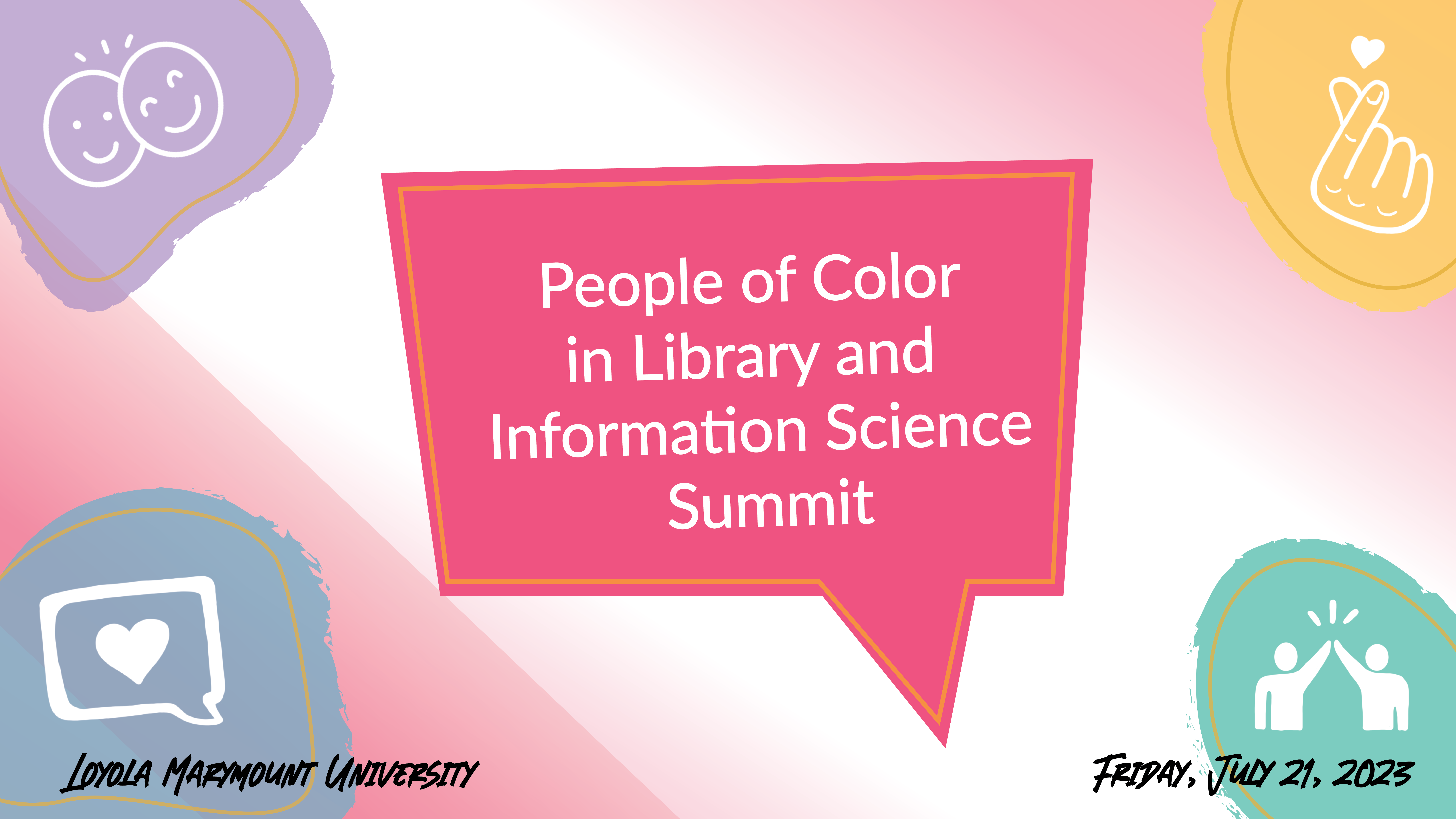Event Type
Presentation
Location
U-Hall Classroom 3230
Track
Mentoring
Start Date
21-7-2023 2:25 PM
End Date
21-7-2023 3:25 PM
Description
Responding to the ongoing lack of diversity in LIS, the BIPOC Become Librarians (BBL) project exposes more Black, Indigenous, and People of Color (BIPOC) students to Master of Library and Information Science (MLIS) career paths by focusing on mentorships and internships, both of which have an impact on increasing diversity. Our project is funded by a Programming Planning Grant from the IMLS Laura Bush 21st Century Librarian initiative to focus on research, mentorship, and internship training. This program will help demystify the profession of librarianship to BIPOC undergraduates by providing guidance and hands-on learning. BBL will encourage students from diverse and underrepresented backgrounds to pursue careers in LIS. San José State University (SJSU) King Library, SJSU School of Information, and San José Public Library have collaborated to develop BBL. During the first six months, we have conducted: a) outreach and recruitment of BIPOC undergraduates to participate in 8 focus groups; b) completion of focus group interviews; c) confirmation of mentors and mentees as well as of a trainer for mentors. Program Development occurs in the second half of the first year and includes the following: a) analysis of data collected from the focus groups; b) training mentors and mentees; and c) solidifying internship partners for the first cohort. At the end of the pilot, we plan to have a plug-and-play mentorship and internship program that can be implemented broadly to introduce library and information science careers to BIPOC undergraduates. We anticipate BBL will increase BIPOC applications to MLIS programs and create a solid pipeline for recruiting a more diverse workforce in the immediate and long term.
Outcomes
- The presentation session will discuss what the BBL team learned from the process of recruiting BIPOC undergraduate students and mentors from a variety of work settings for the BBL mentorship program. Participants will be able to identify various strategies implemented and situations in which recruiting strategies worked successfully or failed.
- From the analysis of the data we gathered from the focus group discussions, session participants can identify the students’ perception of librarianship as a profession, their perceived barriers to entering an MLIS program, and their expectations and/or disregard for career prospects in LIS.
- Participants will understand the detailed processes of solidifying internship partners with organizations and libraries to participate in BBL. They can demonstrate how to develop guidelines, learning objectives, and possible projects identified for student interns while collaborating with internship partners.
Session 3B: Findings from the Research and Program Development Phase of the BIPOC Become Librarians Project
U-Hall Classroom 3230
Responding to the ongoing lack of diversity in LIS, the BIPOC Become Librarians (BBL) project exposes more Black, Indigenous, and People of Color (BIPOC) students to Master of Library and Information Science (MLIS) career paths by focusing on mentorships and internships, both of which have an impact on increasing diversity. Our project is funded by a Programming Planning Grant from the IMLS Laura Bush 21st Century Librarian initiative to focus on research, mentorship, and internship training. This program will help demystify the profession of librarianship to BIPOC undergraduates by providing guidance and hands-on learning. BBL will encourage students from diverse and underrepresented backgrounds to pursue careers in LIS. San José State University (SJSU) King Library, SJSU School of Information, and San José Public Library have collaborated to develop BBL. During the first six months, we have conducted: a) outreach and recruitment of BIPOC undergraduates to participate in 8 focus groups; b) completion of focus group interviews; c) confirmation of mentors and mentees as well as of a trainer for mentors. Program Development occurs in the second half of the first year and includes the following: a) analysis of data collected from the focus groups; b) training mentors and mentees; and c) solidifying internship partners for the first cohort. At the end of the pilot, we plan to have a plug-and-play mentorship and internship program that can be implemented broadly to introduce library and information science careers to BIPOC undergraduates. We anticipate BBL will increase BIPOC applications to MLIS programs and create a solid pipeline for recruiting a more diverse workforce in the immediate and long term.
Outcomes
- The presentation session will discuss what the BBL team learned from the process of recruiting BIPOC undergraduate students and mentors from a variety of work settings for the BBL mentorship program. Participants will be able to identify various strategies implemented and situations in which recruiting strategies worked successfully or failed.
- From the analysis of the data we gathered from the focus group discussions, session participants can identify the students’ perception of librarianship as a profession, their perceived barriers to entering an MLIS program, and their expectations and/or disregard for career prospects in LIS.
- Participants will understand the detailed processes of solidifying internship partners with organizations and libraries to participate in BBL. They can demonstrate how to develop guidelines, learning objectives, and possible projects identified for student interns while collaborating with internship partners.





